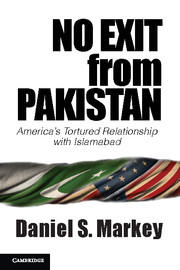7 - America's Options
Published online by Cambridge University Press: 05 June 2014
Summary
General Mirza Aslam Baig could not have been any more polite as he rearranged the pillows on his finely upholstered sofa to make space for his American guest. The cool, dim sitting room with its gilded décor was a welcome respite from the heat of mid-May 2012 in Rawalpindi. A decade earlier, it would have been possible to stroll the short distance from Baig's home to the official residence of Pakistan's serving army chief. The threat of terrorist attacks had, however, forced the construction of high white walls around the neighborhoods, separating Baig, a retired army chief, from his successors. The soft-spoken octogenarian settled into a nearby armchair and, after beckoning for tea and a generous array of Pakistani snacks, quietly explained that it was not he who had turned against the United States, but the United States that had turned against Pakistan.
Baig's early experiences with the United States were mainly positive ones. As a young officer in the 1950s, he joined Pakistan's newly formed Special Services Group, an elite commando unit, and trained with American forces in guerrilla warfare. Washington's goal then was to build a “stay-behind organization” of Pakistani officers that could melt into the population and resist occupation in the event of an invasion by the Soviet Union.
- Type
- Chapter
- Information
- No Exit from PakistanAmerica's Tortured Relationship with Islamabad, pp. 200 - 238Publisher: Cambridge University PressPrint publication year: 2013



